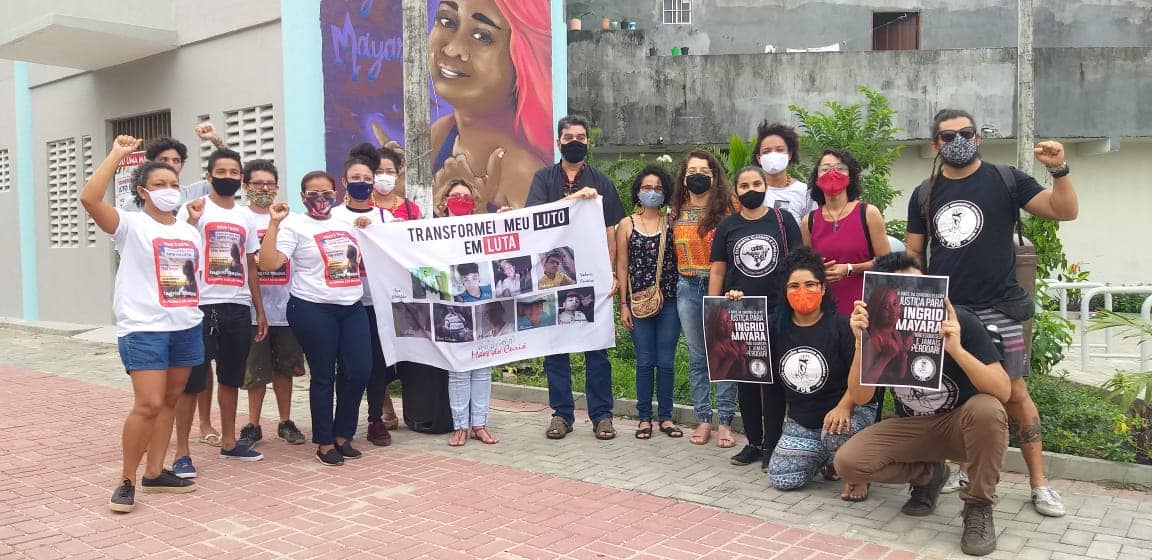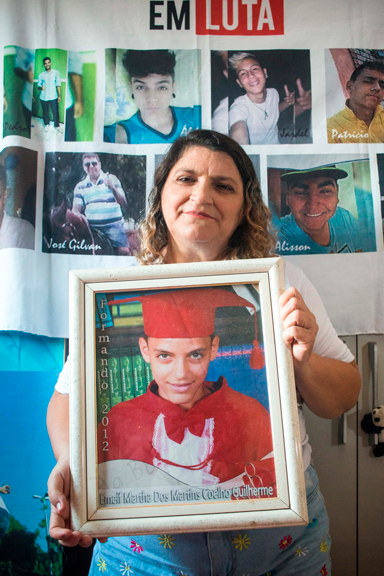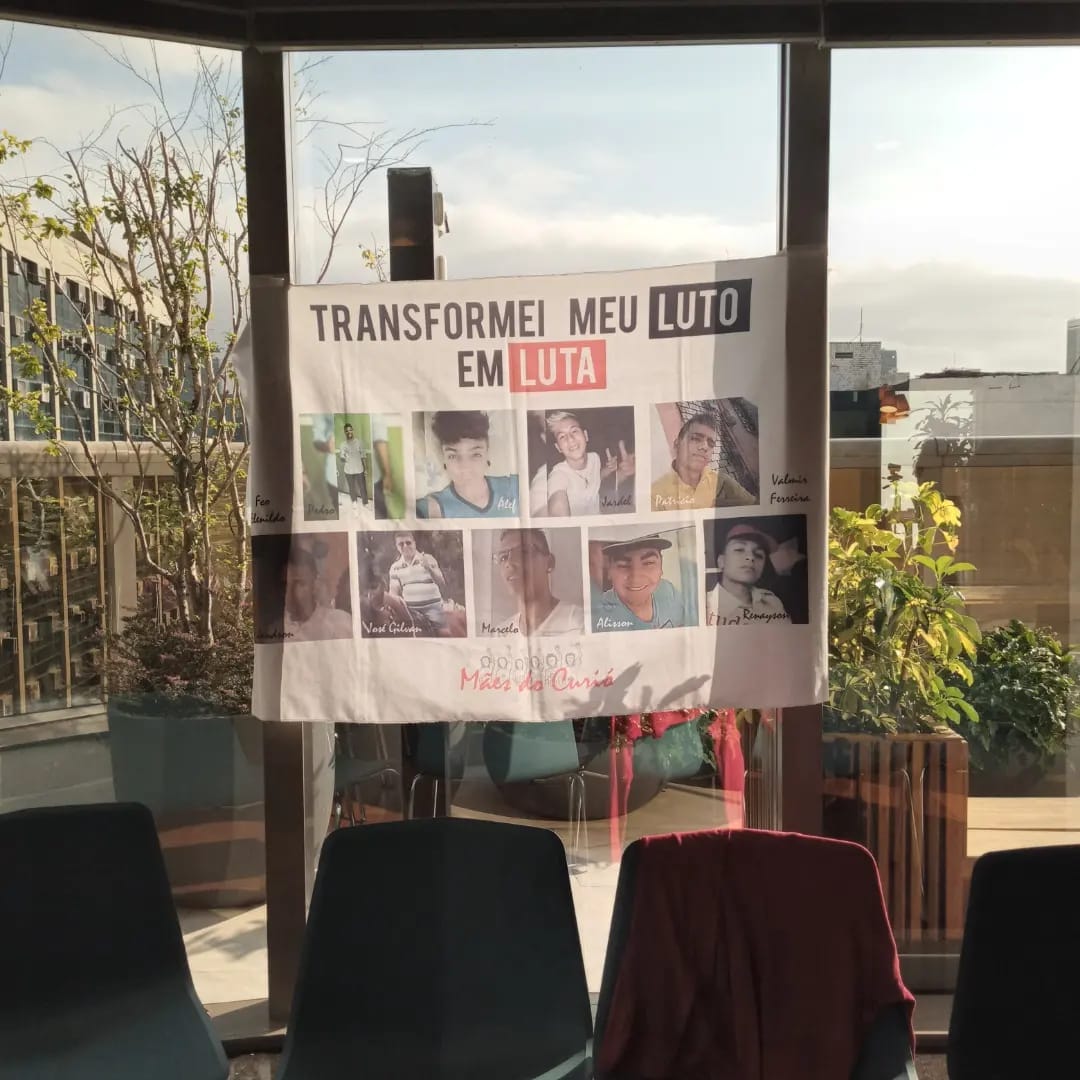Mothers of Curió, a tie that not even death can undo
In Ceará, a project created by and for mothers of victims of police brutality seeks for the community a support that does not come from the State


Credit: Disclosure
By: Eduarda Nunes – Lupa do Bem / Favela em Pauta
The Mães do Curió (Mothers of Curió) Movement, founded in Bairro do Curió, on the outskirts of Fortaleza – CE, is an organization that for almost 7 years has created spaces of welcoming and fights for justice, for mothers and relatives of victims, in cases of armed violence by the State against the youth of the periphery.
In November 2022, seven years will have passed since the biggest massacre caused by state agents in the history of Ceará. This is how the Messejana massacre, or Curió, is referred to, where 11 young people were murdered by 34 state military policemen. Until today, the relatives of each of them fight for the continuity of their lives with dignity against the impunity of those responsible for the deaths of their children. That’s how the Movement of Mothers and Families of Curió came about.
Edna Carla is one of the movement’s leaders. Álef’s mother, today in addition to working as a caregiver for the elderly, she became a staunch human rights activist and co-founder of the Mothers of the Periphery of Victims of Police Violence Movement in Ceará. Since “eleven victims who were killed in 2015 were not enough to calm the state”, she comments, the intention is to make sure that other mothers do not have to go through what they have.
The activist says that in addition to claiming justice for the murders and the preservation of the children’s memory, caring for and providing assistance to the mental health of the family members of each of the victims is one of the strongest struggles of the movement. In addition to depression, the suicide of mothers of murdered children who were becoming teens is one of the biggest concerns. It is in the mothers’ movement that they seek and reciprocate support to follow in legal and personal processes. “It is in self-care that we are strengthened”, says Edna.
Follow-up of the case that led to its creation
Since 2015, these women have joined the national movement for justice for victims of state violence. They build spaces such as the National Campaign of Mothers for Memory, Justice, Guarantee of Rights, Bread and Vaccination for all, the National Network of Mothers and Relatives of Victims of State Terrorism and the Popular Forum for Public Security. Today they consider that Ceará’s justice system is not agile in terms of holding the people who murdered their children accountable.

45 police officers were denounced by the Ceará Public Ministry in 2015 for the deaths of Álef Souza Cavalcante, Pedro Alcântara Barroso do Nascimento Filho, Jandson Alexandre de Souza, Renayson Girão da Silva, Patrício João Pinho Leite, Jardel Lima dos Santos, Antônio Alisson Inácio Cardoso, Marcelo da Silva Mendes, Valmir Ferreira da Conceição, Francisco Elenildo Pereira Chagas and José Gilvan Pinto Barbosa.
34 went to popular jury, 10 were considered unpronounced for not having sufficient evidence to be considered defendants and the complaint against Colonel Plauto Roberto de Lima Ferreira was not accepted. Some of the accused have even returned to work with some restrictions. Mothers are outraged to see that they are still paying the salaries of those who took their children.
Audiobook in defense of the memory of the victims and Mães of Curió
In the fight for the memory of the victims, the Mothers and Family Movement of Curió launched in 2021 a book and an audiobook about them. It was for this purpose that ONZE was produced and it is possible to learn a little about the victims, but also about the mothers who were orphaned by them, as well as the development of the legal processes involving the case. In addition to them, the documentary entitled “Onze – the massacre of Messejana” was also made through the production company Nigeria Audiovisual.


The Mães of Curió remain attentive and increasingly engaged in the struggle for justice for their children and all the mothers who have seen their own lives shortened by the hands and weapons of the State. “In the favela, we only see favela mothers burying their children because it seems that in the favela the only thing they need is death. In the periphery there is no psychological care for people, the necessary health care, nothing comes that will favor the poor”, highlights the leader Edna Carla.
How to support the work of the Mães do Curió Movement
To support and enable the Mães of Curió to continue offering shelter to the mothers and relatives of the victims, in addition to strengthening the fight for justice, it is important to follow the organization’s work on social media, such as the @movmaesdocurio profile on Instagram, and also to engage in various initiatives, such as the audiobook ONZE, on Spotify.
For other forms of occasional support, the movement provides the following email addresses: maesdaperiferia2020@gmail.com, ednacarla4949@gmail.com, ednacarla1820@gmail.com.


